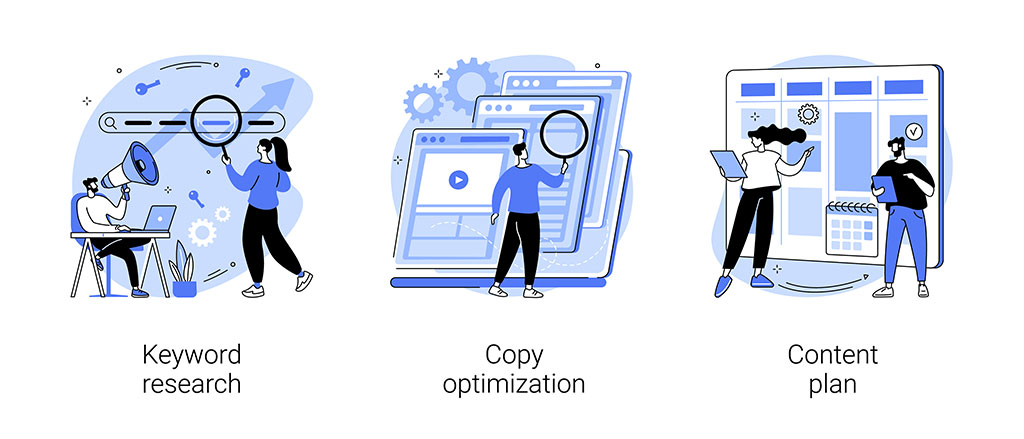Originally published by Sabrina Martinez, Content Manager. Updated and revised by Sara Jokela, 11/16/24.
For many business owners and digital marketers alike, search engine optimization is often portrayed as a mysterious process that requires insider insight to master. We’ve heard our share of “SEO tactics,” like including hidden keyword text or links on web pages or spamming other blog comments with website links.
Fortunately, these tactics don’t work. And we say “fortunately” because while these black-hat methods are intended to boost your ranking and get web content higher on the search engine results page (SERP), they take away from reader experience, which can hurt your reputation and conversion rate in the long run.
So, if these ineffective SEO tricks aren’t the answer to boosting your SERP rankings, then what is? Quality content! Here’s our unpopular opinion: Google’s algorithm updates are not intended to fool and thwart marketers. Rather, these changes are designed to improve reader experience and first show content that best answers a specific search inquiry. When creating content, whether it be a webpage or a blog, your first priority should always be creating genuinely helpful content that is engaging and comprehensive.
Great content paired with the right keywords are a recipe for SEO success. In this blog, we’ll cover why keywords are so essential for your SEO strategy and point you toward the right tools and steps for choosing the right keywords for your mental health care blogging strategy.
Interested in content management services – including SEO-friendly blogs? Learn more about how we can help here.
Understanding Mental Health and SEO
What is Mental Health?
Mental health refers to the state of psychological well-being in which a person realizes their own potential, copes with the normal stresses of life, works productively, and contributes to their community. Good mental health helps a person lead a relatively happy and healthy life and demonstrates resilience when facing adversities. Mental health is an essential aspect of overall health, and it is crucial to understand its importance in today’s society.
The Role of Search Engine Optimization in Mental Health Services
Search engine optimization (SEO) plays a vital role in mental health services by helping mental health professionals and businesses reach their target audience online. By optimizing their website and content with relevant keywords, mental health professionals can increase their online visibility, attract more targeted traffic to their website, and bring in new clients. SEO is essential for mental health businesses to establish themselves as authoritative sources online and provide valuable information to people seeking mental health services.
A Quick Note About Off-Page SEO and Technical SEO

When we talk about keywords and webpage content, we’re addressing on-page SEO. Essentially, on-page SEO is the content that appears on the page – including titles, headers, keywords, lists, title tags, meta descriptions, and quality content.
There is another piece to your SEO strategy that’s incredibly important. Off-page SEO includes factors outside your website that affect your content’s ranking. This is because domain authority is an important piece to SEO. The main way Google tracks domain authority is by considering how many backlinks a website has. A backlink is when another website links back to a page on your site. The number of unique links and the domain authority of each website linking back to yours all contribute to how Google measures your site’s domain authority.
Technical SEO involves the security and structure of your site. If your site is buggy, insecure, or badly structured, Google isn’t going to want to send readers there. A slow or unsafe website means a poor user experience for anyone who lands on your blog or webpage. Top factors to consider for technical SEO include:
- making every page on your website crawlable
- installing an SSL certificate
- using a fast website hosting company
- limiting duplicate content
- ensuring your website is mobile friendly
- registering your site with Google Search Console
- creating an XML sitemap
Want to ensure your website is secure and up to best practices? Learn more about our web hosting and technical SEO services.
What Is a Keyword for SEO?

Before we dig too deep into figuring out the right keywords for your mental health SEO strategy, it’s important you know eBefore we dig too deep into figuring out the right keywords for your mental health SEO strategy, it’s important you know exactly what a keyword is. When we talk about keywords in SEO, we’re not just referring to the main topic or idea you’re covering in your content. An SEO keyword is the word or phrase you want to rank for on Google. For example, if you had a keyword phrase of “What are the symptoms of depression?” your goal is to show up as high as possible on the results page when someone searches for that phrase.
Keywords related to ‘mental health conditions’ are crucial for attracting the right audience, as they address serious health issues and the need for greater awareness and support.
Do SEO Keywords Matter?
While many “SEO tricks” from the past are outdated, frowned upon, and rejected by Google’s algorithm, SEO keyword research is still the cornerstone of content SEO. After all, what is a search engine except a tool used to generate a list of web pages that relate to a specific keyword or keyword phrase?
When putting together a blogging strategy for your mental health practice, you can’t just write content, publish it, and expect it will show up in front of someone looking for your services. As a mental health professional, you need to identify your goals and target audience and then determine the phrases that your ideal client is most likely searching for to achieve that goal.
Want to see how SEO fits into the larger picture of your mental health marketing strategy? Explore our full suite of mental health marketing services.
How To Choose Target SEO Keywords for a Mental Health Practice
The first step in choosing keywords is identifying the goal for your content. Are you trying to answer a common question people have about a mental health topic you’re passionate about? Are you trying increase calls or have more clients in a specific type of therapy (such as couples or group therapy sessions)?
Having a specific marketing goal can guide you in the next step, which is to come up with specific topics you want to cover. For an example, let’s say you’re passionate about postpartum therapy and your goal is to draw in new mothers for counseling. You could then come up with a list of topics that your target audience (new moms who might be struggling with their mental health) would be searching for. This list might include topics like:
- Postpartum depression
- New parent anxiety
- Birth trauma
- Baby blues
- Body image issues
- Generalized anxiety disorder
Performing Keyword Research for Long-tail Keywords
Once you have a list of topics you want to cover, you need to do keyword research to pin down exactly what people are searching for. Your research should focus on long-tail keywords that are more specific than the broad topics you chose. For instance, long-tail keywords for “postpartum depression” might include “symptoms of postpartum depression” and “how to find a therapist for postpartum depression.” With one topic, like “postpartum depression” it’s easy to see how you create 10 or more long-tail keywords that could each serve as their own blog post or as a section in a blog.
Long-tail keywords related to mental disorders can help attract a more targeted audience by addressing specific conditions, symptoms, and treatments.
Long-Tail vs Short-Tail Keywords
When it comes to SEO for mental health services, it’s essential to understand the difference between long-tail and short-tail keywords. Short-tail keywords are broad and generic, such as “mental health services,” while long-tail keywords are more specific, such as “anxiety therapy services in New York City.” Long-tail keywords are less competitive and more targeted, making them more effective for attracting the right audience. By using a combination of short-tail and long-tail keywords, mental health professionals can create a robust SEO strategy that drives results.
The Best SEO Tools for Keyword Research
When choosing long-tail keywords, you don’t want to just guess at what people are searching for. Every SEO expert uses tools to gather analytics on different keywords and identify the right phrases they should be ranking for.
A few of the most popular SEO tools on the market include:
The main goal of these SEO tools is to help you identify three main things:
- Search Volume: Make sure the keyword you optimize your content for is a phrase people are actually searching for. You can use SEO analytics platforms, like SEMrush, to measure how many searches have been performed for a certain keyword. Similarly, you also want to choose keywords or topics that you know your target audience will enjoy and engage with.
- Search Intent: Keyword optimization isn’t just a matter of sprinkling keywords in the spots they should go. The quality and relevancy of the blog always trump keyword placement. You need to consider what a person is likely looking for when they search for a phrase (because that’s what Google is doing too). If you look up “mental health services near me,” you won’t be taken to a results page with blog posts explaining what mental health treatment is. Rather, you’ll be taken to a list of local results showing clinics nearby where you can get treatment.
- Keyword Competitiveness: You need to choose keywords that are both popular but easy to rank for. Sure, a lot of people might search for “what is mental health?” But this means several large, top companies are already competing for this keyword as well. Keywords are similar to niches – you want to narrow your focus to reach the exact audience you’re looking for with less competition.
Avoiding Common Mistakes
Keyword Stuffing and Over-Optimization
Keyword stuffing and over-optimization are common mistakes that can negatively impact a mental health professional’s SEO efforts. Keyword stuffing involves using too many keywords in a piece of content, making it seem unnatural and spammy to search engines. Over-optimization occurs when a website is optimized too heavily for a specific keyword or phrase, leading to a penalty from search engines. To avoid these mistakes, mental health professionals should focus on creating high-quality, informative content that uses keywords naturally and strategically. By doing so, they can improve their online visibility and attract more targeted traffic to their website.
Leave the SEO Keyword Research to Your Digital Marketing Gurus

While SEO keyword research might not be a mysterious and complicated as some “experts” would have you believe, crafting a solid SEO strategy does take a lot of time and practice to do right.
Choosing the right mental health keywords is essential for your overall content strategy. If you’re putting in time or resources to create content, you need to ensure that your investment is well-spent. If your content remains invisible on search engines, it’s not building brand awareness or gaining you new leads.
When addressing topics like mental illness, it is crucial to use the appropriate keywords to reach and educate your audience effectively. Recognizing the significance of mental illness in society and promoting understanding can help decrease stigma and highlight the necessity for professional support.
When you choose Beacon Media + Marketing to take on your content management needs, we have the right tools and expertise to create a blogging strategy that includes the most effective keywords you should be ranking for. Most importantly, we’ll ensure every web page or blog is relevant and engaging to what your target audience is searching for.
Want to boost website traffic with organic content that rank on search engines and gets conversions? Schedule your free consultation with us today!